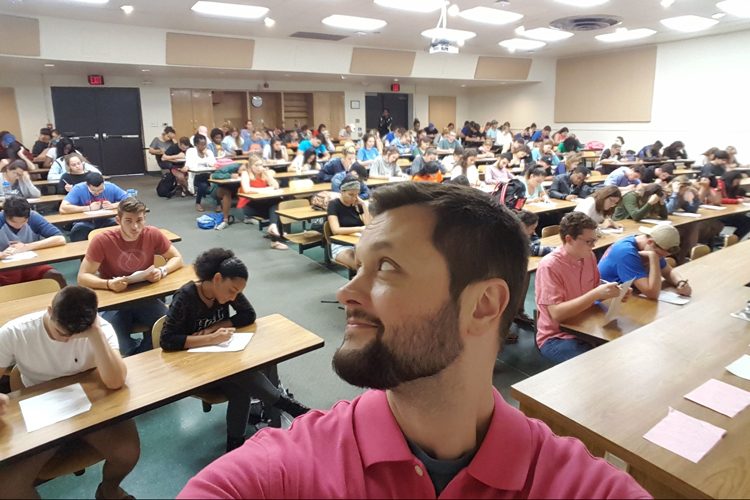Read this article in Spanish here.
Updating your social media, building your personal brand, looking for internships, all while keeping up with coursework and extra-curriculars… the list of things to do for young journalism students goes on and on. But don’t worry, we are here to help you prioritize.
In an exclusive interview, ROOSTERGNN spoke to Andrew Selepak, professor in the department of telecommunication and Director of the graduate program in social media at the University of Florida. Selepak has been teaching media and reporting courses for more than ten years, including classes on news, sports, travel, and entertainment reporting and media writing. Numerous former students of his are now working as reporters around the world!
He has so much advice to give – read on to find out and implement it immediately in your journalism career!
You have been teaching media and reporting courses at the University of Florida (UFL) for over 10 years, and have numerous former students who are currently working as reporters around the world. If there were five points of key advice you would give to aspiring reporters, what would they be? What should students do in college to ensure their “employability” upon graduation?
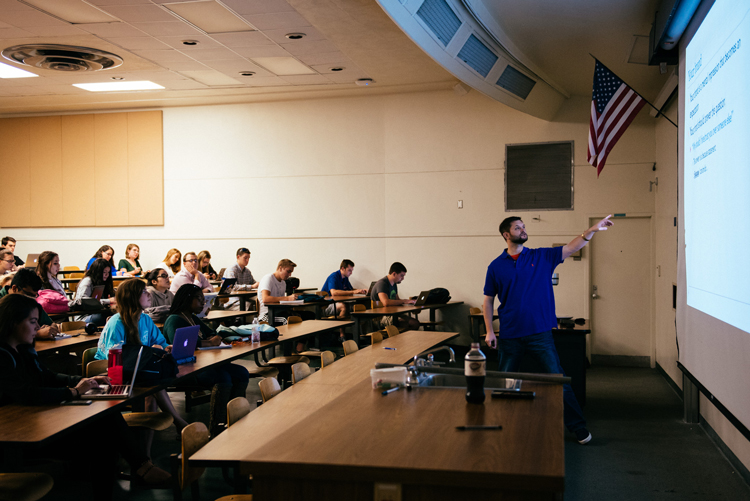
Andrew Selepak during a class at university
The five points I would offer to aspiring reporters:
The media landscape has changed both in how we report and how we consume news. Reporters need have more than just basic reporting skills, they also need to know how to do coding and digital design to produce their online stories. They also need to understand SEO and how to craft a story that can be found by others online.
Few people work for a traditional media outlets alone anymore. Newspapers do video, television stations do long form written stories, and all media is online.
Aspiring reporters need to have multimedia skills and be able to edit video, photos, and sound, but also to be able to write well, create graphics and infographics, take photos, and shoot quality video.
Aspiring reporters must also learn how to analyze data whether it is web traffic to their site, economics reports, social media analytics, or simply to check on the data provided by an official source.
Aspiring reporters need to understand their role in a democratic society is not to showcase partisan ideology or regurgitate press releases, but to present the truth of a story, the unbiased truth, and place the information within a historical context to help the audience become better voters, consumers, and citizens.
Aspiring reporters need to develop a tough skin. There is a lack of trust in the media these days and reporters need to have the ability to deal with the slings and arrows of those who denigrate them and their profession.
Reporters need to be selfless promoters of their own work. While they should not promote a side or an agenda or engage in political discussions revealing their own ideologies, they must be active on social media to share their work with a larger audience while building their brand. The best promoter is the self-promoter, and reporters need to be able to make sure their work is seen, heard, and read.
As the Director of UFL’s graduate program in social media, both your courses and your research revolve around the societal implications of social media. In a recent article for Fortune magazine, for example, you argued that freedom of speech does not mean freedom of consequences. What does this imply for students today? How careful do aspiring journalists need to be with regards to using social media?
Social media is an incredible tool for journalists. It allows them to find stories and sources, to share their work, and learn about stories being covered or missed by their peers. But there are also dangers involved.
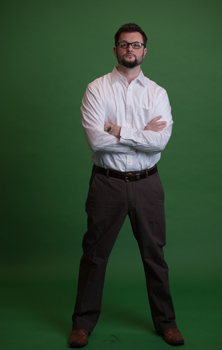
Andrew Selepak
All reporters need to remember that what they say on social media has a larger audience than they can imagine and they don’t know who might see their tweet, Facebook message, or Instagram post.
At all times, reporters must be under the assumption that anything they post will be judged by others and even the most neutral post can be interpreted in a way different from the reporter’s intentions.
This means reporters should reread anything they post to social media at least three times before hitting send. They should check for spelling and grammar mistakes, factual mistakes, and check to see if anything they are posting comes from an unbiased, and factual story, or opinion from a non-journalist or biased source that can turn off an audience.
Journalists need to understand that including in your Twitter bio that “Retweets are not endorsements” does not protect them from being judged for what they retweet, like, or share on Twitter or any other platform.
Often, there appears to be a lack of understanding of what Freedom of Speech means. To too many, they believe they have the right to say anything they want and that their words will have no repercussions. We are all judged for what we do and say online, and while an individual has the ability to say almost anything on social media and particularly Twitter, this does not mean they won’t lose friends or job opportunities for what they say, or won’t be viewed negatively.
Reporters need to remember that in the rush to get a story online or shared through social media that this does not relinquish their duty to be accurate with what they share. Better to be second and right than first and wrong when posting to social media.
Reporters need to remember there are a lot of people out there sharing half-truths, rumors, and false stories. While the public can mistakenly share these stories, reporters cannot. A reporter’s ability to do their job rests on their credibility, and the only way to maintain this credibility is to ensure any and everything they share online is true and factual. It is very difficult for a reporter to do their job when they are no longer seen as credible.
Reporters must also recognize the longevity of what they post online and that it never goes away and is often searchable. This means that the photos they share can be searched with reverse Google image search, or the posts they make to Twitter can be searched with Twitter’s advanced search. So it is important for reporters every once in a while to go back and review what they have posted in the past and delete anything that either no longer reflects them and their feelings or that they might feel embarrassed about with the passage of time.
And when it comes to looking for jobs and internships, how can students leverage social media to their advantage?

Andrew Selepak
Social media can be a double-edged sword for students looking to get a job or internship.
Social media is the best way to engage in personal branding and promotion. Students need to learn how to demonstrate their skills and abilities to a wider audience using online resources. In some of my classes, I require students to build their own personal websites where they can highlight their work and experience and have a digital resume that can be passed from hiring manager to hiring manager.
Just as students are posting content online to promote their brand, companies and potential employers are also looking online to see what their future employees are posting to social media. Reporters should not want what they post online to embarrass them, and companies don’t want what they employees post online to embarrass the company. One of the best ways to know what someone will post online is to see what they have posted in the past, which means employers are searching for those who apply for jobs with them to see how they engage in social media.
Social media is a great way to connect and network online. Students should be using these resources long before they are looking for a job or internship to develop relationships with those who can one day help them. Networking isn’t about connecting with someone so they can offer you a job, it is more about connecting with someone in the event they can pass along information or even a recommendation that leads to a job or internship.
Social media is a great place to look for jobs and internships, especially Facebook.
Facebook is a more personal social networking site because to be Facebook friends, both individuals have to agree. At the same time, Facebook also offers a lot of private and public interest groups. Frequently people will post job or internship opportunities on Facebook or in Facebook groups knowing they are providing the information to either people they know or people they have a common bond with from both belonging to a group.
Because so many jobs now involve social media, it is important for students to become familiar with the platforms and what they can do including the metrics and data analytics available.
Simply posting information and stories to social media without knowing how they perform is useless. Being aware of the metrics behind social media makes posts more powerful.
Your course on writing for the electronic media involves a section on personal branding. Apart from social media, what are some key steps students should take in order to get on the radar of future employers?
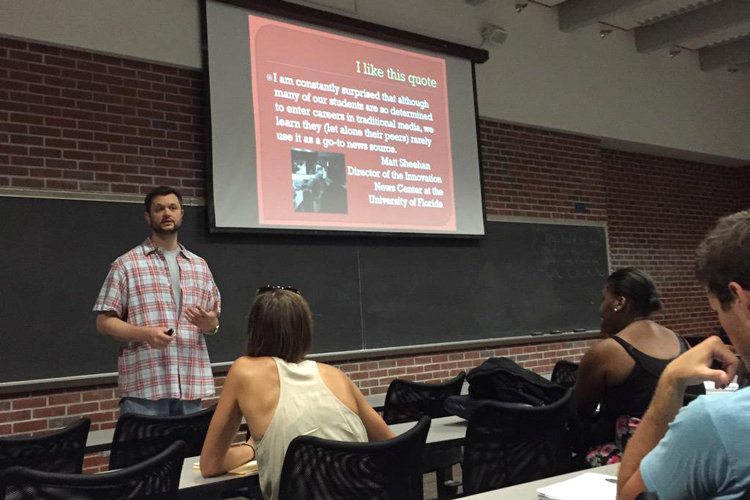
One of Selepak’s classes at the University of Florida
I am a big believer in higher education; I have three degrees myself. But the classroom can’t teach students everything they need to know to be successful in a future career especially when we all change careers so often over the course of a lifetime.
I encourage my students to learn new skills outside of the classroom or their coursework. In one of my classes, they complete a personal branding assignment which requires them to use a professional Twitter account and monitor their use and growth of followers and interactions over the course of the semester. They also must create a LinkedIn account and connect with people in their future career field. But they also have to complete an online training course in an area that interests them and then post their certification to their LinkedIn account. Students can pick any area from personal speaking to video editing to personal finance. The goal is for them to learn new skills and be able to demonstrate their knowledge of these skills through posting their certificate to LinkedIn.
I also encourage students to take advantage of any graduate coursework available to them while they are undergrads. We offer a few graduate programs in areas like social media and web design, and undergraduate students can begin these programs while they are still undergrads learning skills not taught in their current classes while also having the opportunity to interact with working professionals in their classes and learn from their older classmates the skills they will need to be successful, and to network with people who may offer them a job or internship.
I am a big believer in personal branding. We all do it, but some of us don’t do enough of it.
Personal branding comes from being active on social media, creating a professional website to showcase you and your work, joining different organizations to meet new people, and even old school techniques like having a business card to handout. I explain to my students that personal branding is a 24/7 job in a world of online and social media. And the opportunity to share their work and talents online can lead to unexpected opportunities not available to those who came before them.
One thing that students often forget about in school is that at some point they are going to apply to grad school, law school, or just need professional recommendations for a job or internship. The worst thing a student can do is wait till they need a rec letter or job recommendation and email a former professor and have to explain who they are and ask for something. Each semester I have 100 to 200 students. Over the past ten-plus years of teaching, I have had over 1,000 students. I cannot remember all of them, and I definitely cannot remember the ones that I almost never spoke with while they were in my class. Students should take the time to get to know some of their professors and realize that someday they might not only need a professor for a recommendation, but that professors get notifications for jobs and internships frequently and share these opportunities with the students they know.
Students need to learn that some industries are not very big. The worst thing they can do is burn a bridge at one job and expect it to not hurt them in the future.
My students work as reporters across the world, work for sports teams, as lawyers, educators, production assistants, and so forth. It is not difficult to see who a person knows and discover mutual connections to find out more about them including recommendations. Social media keeps us connected across industries and time and space. Students need to learn how their performance at one job can impact how they will be viewed going into an interview at another job simply because of how connected we all are these days.
In a recent article, you argue that if you want content to go viral, start by being famous, i.e. being an influencer. There are many college bloggers (and Instagrammers) who are already making significant incomes. For students who are interested in becoming influencers (or Insta-famous), what tips do you have for getting started?
A few years ago it was easier to build a following on social media for individuals who otherwise were not well-known. It was possible to start a YouTube channel with funny and well-produced videos that would be watched or shared, or build a following on Instagram with travel photos or fitness advice. But as more people have attempted to find fame online through social media, becoming famous online has become more and more difficult. It is still possible to build a brand from the ground-up but it has to be strategic and not something that happens overnight. With over 2-billion people on social media, you need to find a way to standout. A few tips would be:
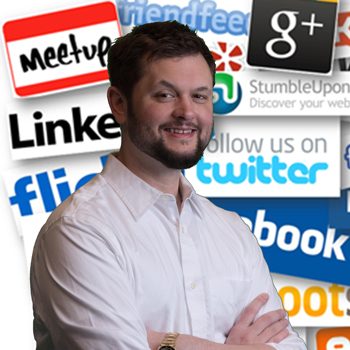
Andrew Selepak
- Be specific with your brand. Whatever topic you select to build a brand around, focus on that. While you might have other interests, followers will want to connect with you early-on because they know what they will get. If you want to build a following around fitness or working-out, don’t create content on other topics.
- Don’t try to be everywhere at once. Instead of trying to create a presence on every platform and creating content for each, start with a few. For some ideas a website and a Facebook page are the best places to start. With a website it is possible to post various multimedia content and create a hub for your work. Facebook then acts as a place to connect and interact with fans. It is also a great way to promote your website to your friends on Facebook who are most likely going to be your earliest fans. Once you have started to establish your brand on these platforms it is then possible to expand and most likely on Instagram because it is already connected to Facebook and Twitter for promotion of your website content.
- It is important to know your audience. If your audience skews older, Facebook is the best platform to reach them. If your audience is younger, Snapchat should be a platform to best connect with your audience. Each platform attracts slightly different users, and it is important to know who your audience is and to find them where they already are online.
- Be consistent with your brand voice. Fans come back because they have expectations. So it is important to be consistent with your content but it is also just as important to be consistent with your tone. If you project being witty then make your posts witty, if you are serious then stay that way. A brand is a mental expectation, and the only way to build a brand is to be consistent in how you present yourself to your audience.
- Building an online brand is not just about taking photos, writing posts, and uploading short videos. Vine is dead. Instagram is now :59 for a video, and Snapchat and Instagram stories are only part of the platforms. It is also important to know how to edit video, to take photos, and measure the success of your posts through understanding Google Analytics or the data metrics provided by each platform. Once you know what your audience responds to, you can use that information to be consistent to give them what they want with newer and better skills to deliver that content to them.
- Interact with fans. Fandom comes from feeling a connection. If you only post content and don’t interact with fans and thank them for following you, they will move on to someone who does appreciate them.
- Interact with other influencers. It is important to promote and one of the easiest ways to do this is to piggyback off other established personalities who can introduce you to their fans. We have an interest in knowing what the people we follow also follow, and connecting with others and having them promote you is a great way to build your own followers.
APPLY FOR OUR INTERNSHIP SEMINARS!
Digital Marketing & Social Media Internship Seminar in Madrid, Spain
Travel Journalism, Photography & Video Internship Seminars in Madrid, Spain
Travel Journalism, Photography & Video Internship Seminar in Havana & Trinidad, Cuba

